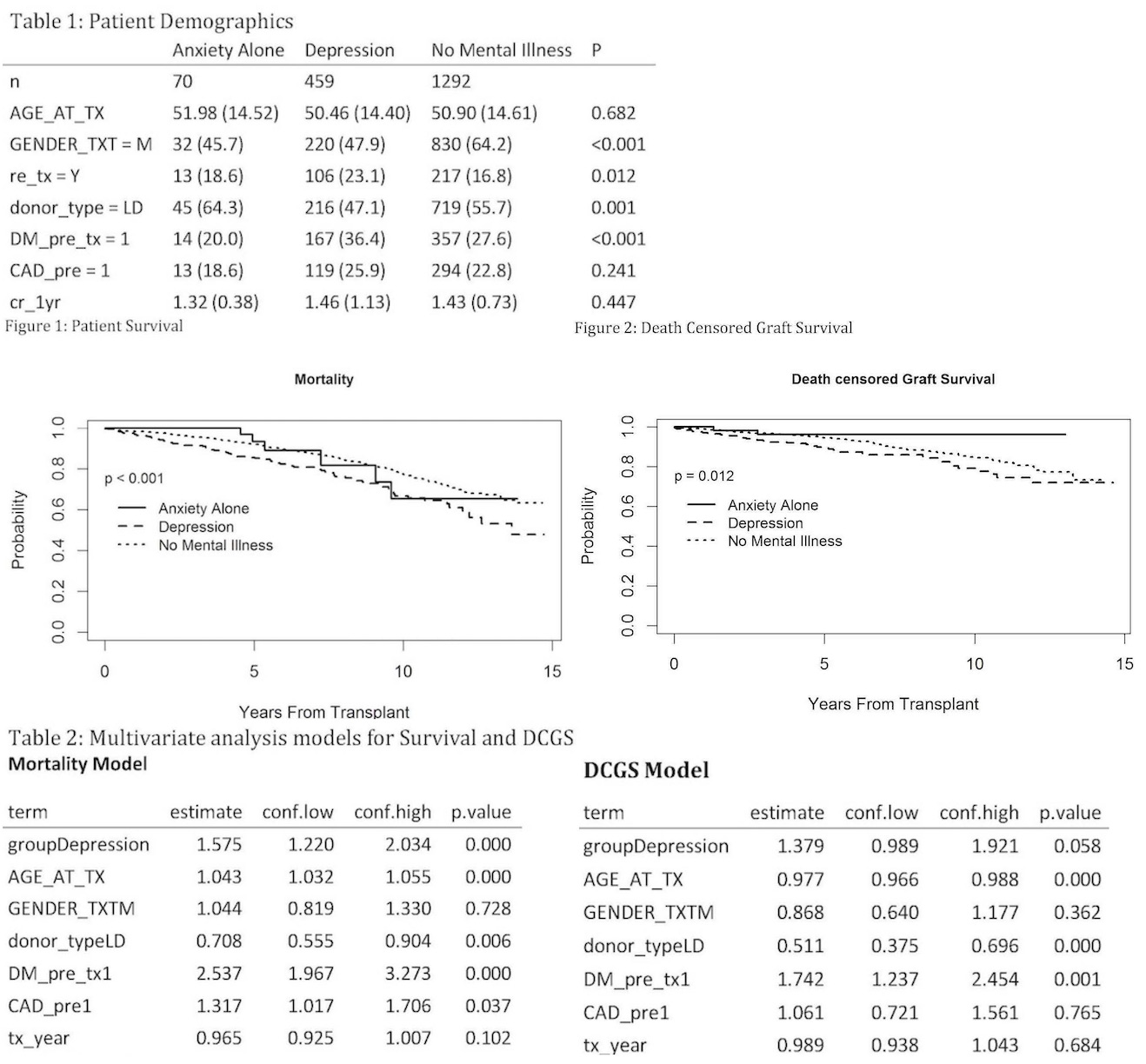Outcomes of Kidney Transplant Recipients with Depression and Anxiety
D. Keys, S. Jackson, S. M. Riad, R. Spong, A. Matas
University of Minnesota, Minneapolis, MN
Meeting: 2020 American Transplant Congress
Abstract number: C-095
Keywords: Adverse effects, Kidney, Morbidity, Psychosocial
Session Information
Session Name: Poster Session C: Kidney Psychosocial
Session Type: Poster Session
Date: Saturday, May 30, 2020
Session Time: 3:15pm-4:00pm
 Presentation Time: 3:30pm-4:00pm
Presentation Time: 3:30pm-4:00pm
Location: Virtual
*Purpose: The outcomes of kidney transplantation in patients with depression and anxiety have been limited by small numbers. This is despite high prevalence of these diseases in the CKD and ESRD population. We sought to examine the outcomes of kidney transplant patients with depression and anxiety that were known at the time of evaluation for listing and compared them with a cohort of patients without these diagnoses.
*Methods: We performed a retrospective single center analysis of patients receiving kidney transplant with depression and anxiety alone identified at time of kidney transplant evaluation and compared to those without. 459 patients had depression, 70 had anxiety, and 1292 patients had no mental health diagnosis at time of evaluation. We evaluated outcomes of patient survival and death censored graft survival (DCGS) and performed a multivariate analysis adjusting for age, sex, donor type, DM, and CAD history.
*Results: The characteristics of the cohort are listed in Table 1. Patients with depression and anxiety were less likely to be male (%): 47.9 and 45.7 vs 64.2;p=<0.001, more likely to be a re-transplant: 18.6% and 23.1% vs 16.8%; p=0.012. Those with depression were less likely to have received a living donor kidney: 47.1% vs 64.3% with anxiety and 55.7 for those with no diagnosis;p=0.001, and more likely to have diabetes: 36.4% vs 20.0% for anxiety and 27.6% for those without; p=<0.001. KM curves for patient survival and DCGS are listed in Figures 1 and 2. Those with depression had lower patient survival compared to those with no diagnosis with 10 year survival % (CI) 66.8 (60.3,74) vs 77.6 (74.4,80.9); p=<0.001. DCGS was lower in patients with depression compared to those with anxiety or no diagnosis; %(CI) 79.3 (73.3,85.8) vs 96.2 (91.1,100) and 84.9 (82.0,87.9). Multivariate analysis was done as listed in table 2. Depression was significantly associated with increased mortality HR (CI) 1.58 (1.22,2.03); p=<0.001 but not DCGS 1.379 (0.99,1.921); p=0.058.
*Conclusions: In a retrospective, single center analysis of 459 patients with depression and 70 with anxiety compared with 1292 controls without either diagnosis, depression was found to be an independent risk factor for mortality but not DCGL. Anxiety was not found to be associated with either outcome.
To cite this abstract in AMA style:
Keys D, Jackson S, Riad SM, Spong R, Matas A. Outcomes of Kidney Transplant Recipients with Depression and Anxiety [abstract]. Am J Transplant. 2020; 20 (suppl 3). https://atcmeetingabstracts.com/abstract/outcomes-of-kidney-transplant-recipients-with-depression-and-anxiety/. Accessed February 23, 2026.« Back to 2020 American Transplant Congress

